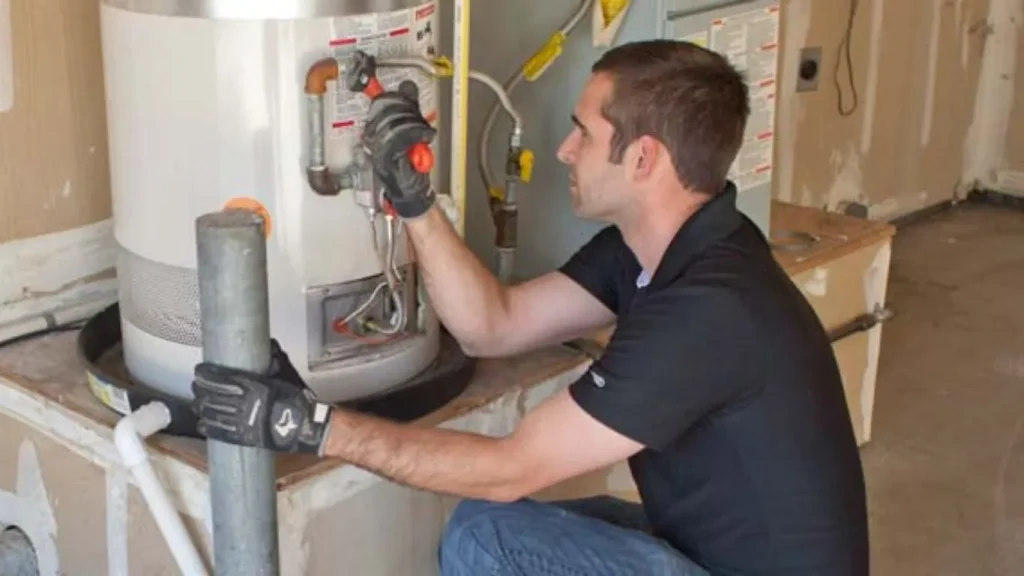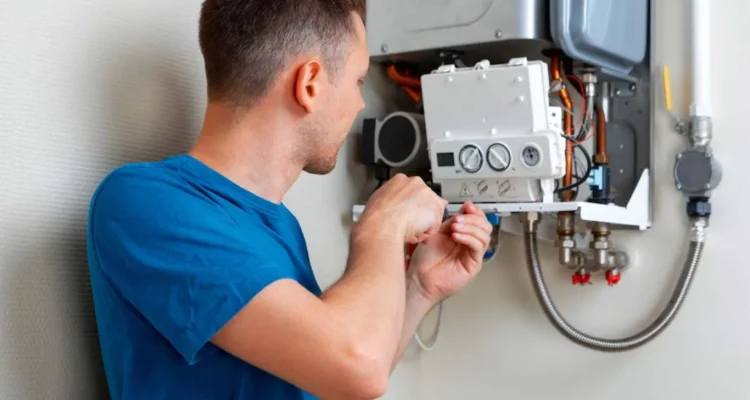Introduction
We’ve all been there—ready to enjoy a hot shower, only to find the water heater has turned off. It’s frustrating and inconvenient, but understanding why your water heater keeps shutting down can help you find a solution. Let’s dive into the common causes and how to fix them.

Understanding Your Water Heater
Before tackling the reasons behind your water heater woes, it’s helpful to understand the basics. There are several types of water heaters, including gas, electric, and tankless models. Each type operates differently, but they all share the same primary function: heating water for your home. Knowing how your specific water heater works can aid in diagnosing problems.
Common Reasons Why Water Heaters Turn Off
Thermocouple Issues
A thermocouple is a safety device found in gas water heaters. It detects whether the pilot light is on and signals the gas valve to stay open. If the thermocouple is dirty or malfunctioning, it might cut off the gas supply, causing the water heater to shut down.
Pilot Light Problems
The pilot light ignites the gas burner. If it goes out frequently, the water heater won’t stay on. Common causes include a draft, a dirty pilot tube, or a faulty thermocouple.
Faulty Gas Control Valve
The gas control valve regulates gas flow to the water heater. If it’s malfunctioning, it can cause the heater to turn off. This issue often requires professional repair or replacement.
Electrical Issues
Electric water heaters rely on several electrical components. Problems with wiring, breakers, or heating elements can cause the heater to shut down unexpectedly.
Overheating
Water heaters have safety mechanisms to prevent overheating. If the water temperature exceeds a safe limit, the heater will shut off. This can be caused by a faulty thermostat or a buildup of sediment.
Sediment Buildup
Over time, sediment from your water supply can accumulate in the tank. This can insulate the heating elements, causing them to overheat and shut down the heater.
Faulty Thermostat
The thermostat controls the water temperature. If it’s not working correctly, it can cause the heater to turn off to prevent overheating.
Clogged or Dirty Air Intake
For gas water heaters, a clean air intake is crucial for proper combustion. A clogged air intake can suffocate the flame, causing the heater to turn off.
High Water Pressure
Excessively high water pressure can stress the water heater, leading to frequent shut-offs. Installing a pressure relief valve can help manage this issue.
Thermocouple Issues
What is a Thermocouple?
A thermocouple is a safety device that senses the pilot light’s heat. It ensures that gas flows only when the pilot light is on, preventing gas leaks.
Common Signs of a Faulty Thermocouple
- Pilot light won’t stay lit
- Water heater shuts off unexpectedly
- No hot water
How to Fix Thermocouple Problems
First, try cleaning the thermocouple with a piece of sandpaper to remove any soot or debris. If this doesn’t work, it may need to be replaced. This is a relatively simple DIY fix, but if you’re unsure, call a professional.
Pilot Light Problems
Causes of Pilot Light Issues
- Drafts blowing out the flame
- Dirty or clogged pilot tube
- Faulty thermocouple
How to Relight a Pilot Light
- Turn off the gas.
- Wait for a few minutes to ensure no gas is lingering.
- Turn the gas back on and use a lighter to relight the pilot.
- If it doesn’t stay lit, there may be an underlying issue.
Preventive Measures
- Ensure the area around the water heater is draft-free.
- Regularly clean the pilot tube.
- Check the thermocouple for signs of wear or damage.
Faulty Gas Control Valve
Function of the Gas Control Valve
The gas control valve regulates the flow of gas to the burner. It’s crucial for maintaining the correct temperature and ensuring safety.
Diagnosing Gas Control Valve Problems
- Water heater turns off unexpectedly
- Irregular water temperatures
- Gas leaks
Solutions for Gas Control Valve Issues
If you suspect the gas control valve is faulty, it’s best to call a professional. They can accurately diagnose the problem and safely replace the valve if needed.
Electrical Issues
Common Electrical Problems in Water Heaters
- Tripped circuit breakers
- Faulty wiring
- Defective heating elements
Troubleshooting Electrical Issues
Start by checking your home’s circuit breaker. If it’s tripped, reset it. If the water heater continues to trip the breaker, there might be a more serious electrical problem that needs professional attention.
When to Call an Electrician
If you’re not comfortable working with electrical components or if the issue persists after resetting the breaker, it’s time to call an electrician.
Overheating
Causes of Overheating
- Faulty thermostat
- Sediment buildup
- Insufficient ventilation
How to Prevent Your Water Heater from Overheating
- Regularly flush the tank to remove sediment.
- Ensure proper ventilation around the heater.
- Check and replace faulty thermostats.
Safety Measures to Take
Always have a temperature and pressure relief valve installed. This valve will release excess pressure and prevent the tank from exploding if the water overheats.
Sediment Buildup
How Sediment Affects Water Heaters
Sediment can insulate the heating elements, causing them to overheat and shut down. It can also reduce the tank’s efficiency, leading to higher energy bills.
Signs of Sediment Buildup
- Popping or rumbling noises
- Reduced hot water supply
- Higher energy bills
How to Clean Your Water Heater
- Turn off the water heater.
- Drain the tank by attaching a hose to the drain valve.
- Flush the tank with cold water to remove sediment.
- Refill and restart the water heater.
Faulty Thermostat
Role of the Thermostat in Water Heaters
The thermostat controls the water temperature. It signals the heating elements to turn on or off as needed.
Symptoms of a Bad Thermostat
- Water that’s too hot or too cold
- Inconsistent water temperatures
- Water heater frequently turning off
Replacing a Faulty Thermostat
Replacing a thermostat is a straightforward task. Turn off the power, remove the access panel, disconnect the wires, and replace the old thermostat with a new one.
Clogged or Dirty Air Intake
Importance of Clean Air Intake
A clean air intake is crucial for gas water heaters to function properly. It ensures that the burner gets enough oxygen to maintain a stable flame.
Signs of a Clogged Air Intake
- Pilot light frequently going out
- Inconsistent heating
- Soot or dirt around the intake
Cleaning the Air Intake
- Turn off the water heater.
- Locate the air intake screen.
- Use a vacuum or brush to remove dust and debris.
- Reassemble the parts and turn the water heater back on.
High Water Pressure
Effects of High Water Pressure on Water Heaters
High water pressure can strain the water heater and cause it to shut off. It can also lead to leaks and damage to the heater’s components.
How to Check and Adjust Water Pressure
- Attach a pressure gauge to an outdoor faucet.
- Turn on the faucet and read the gauge. Ideal pressure is between 40-60 psi.
- If the pressure is too high, adjust the pressure regulator on your main water supply line.
Installing a Pressure Relief Valve
A pressure relief valve helps maintain safe water pressure in your system. If your heater doesn’t have one, consider installing it to prevent pressure-related shutdowns.
Preventive Maintenance Tips
Regular Maintenance Schedule
- Inspect your water heater monthly for leaks or signs of wear.
- Flush the tank every six months to remove sediment.
- Check the anode rod annually and replace it if it’s corroded.
DIY Tips for Maintaining Your Water Heater
- Clean the area around your water heater to prevent dust and debris buildup.
- Test the temperature and pressure relief valve to ensure it’s working.
- Insulate the water heater and pipes to improve efficiency.
When to Call a Professional
If you’re uncomfortable performing maintenance tasks or if the water heater shows signs of significant issues, it’s best to call a professional for help.
When to Replace Your Water Heater
Signs It’s Time for a New Water Heater
- Age: Most water heaters last 8-12 years.
- Frequent repairs: Constant issues may indicate it’s time for a replacement.
- Rusty water: Corrosion inside the tank is a sign of aging.
- No hot water: Persistent lack of hot water suggests major problems.
Choosing a New Water Heater
Consider the following when selecting a new water heater:
- Type: Gas, electric, or tankless.
- Size: Ensure it meets your household’s hot water needs.
- Efficiency: Look for models with high energy ratings to save on bills.
Professional Installation vs. DIY
While installing a water heater yourself can save money, hiring a professional ensures it’s done correctly and safely. Consider your comfort level and expertise before deciding.
FAQs
Why does my water heater pilot light keep going out?
The pilot light may go out due to a draft, a dirty pilot tube, or a faulty thermocouple. Cleaning the pilot tube and checking the thermocouple can help resolve this issue.
How often should I flush my water heater?
It’s recommended to flush your water heater every six months to remove sediment buildup and maintain efficiency.
Can I fix a water heater myself?
Many water heater issues can be fixed with basic DIY skills, such as cleaning the thermocouple or relighting the pilot light. However, for more complex problems, it’s best to call a professional.
What is the lifespan of a water heater?
Most water heaters last between 8-12 years. Regular maintenance can help extend the lifespan of your unit.
How can I improve the efficiency of my water heater?
You can improve your water heater’s efficiency by insulating the tank and pipes, flushing the tank regularly, and maintaining a moderate temperature setting.
Conclusion
Dealing with a water heater that keeps turning off can be frustrating, but understanding the common causes and how to address them can help you find a solution. Regular maintenance and timely repairs are key to keeping your water heater running smoothly. If you’re unsure about any step, don’t hesitate to call a professional to ensure your water heater is safe and efficient.


Congratulation!